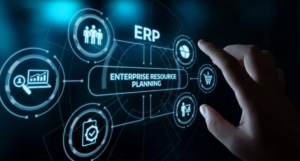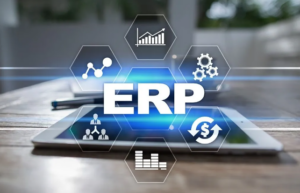Enterprise Resource Planning (ERP) Software – Enterprise Resource Planning (ERP) software has become the backbone for modern businesses aiming to streamline their operations. Whether you’re managing inventory, human resources, or finances, ERP software can consolidate your tools into one powerful solution.
In this guide, we’ll explore some of the best ERP software products available, break down their features, and show you how they can benefit your business.
What is ERP Software?

Enterprise Resource Planning (ERP) software is an integrated suite of applications that helps businesses automate and manage core processes, such as inventory management, human resources, accounting, and supply chain management. Rather than using multiple systems to handle different tasks, ERP software allows companies to unify their operations under one roof, making it easier to share data, generate reports, and make informed business decisions.
Benefits of ERP Software
Implementing ERP (Enterprise Resource Planning) software brings a wide array of benefits that can greatly improve efficiency, productivity, and profitability in a business. Here’s an in-depth look at the most impactful advantages of using ERP solutions:
1. Streamlined Business Processes
ERP systems integrate multiple business functions into a single platform, automating processes like order management, inventory tracking, and invoicing. With all departments sharing a unified platform, workflows become more efficient, eliminating manual tasks and reducing bottlenecks.
- Benefit: Improved workflow management reduces human errors and accelerates routine tasks, allowing your business to operate more smoothly.
2. Real-Time Data and Analytics
ERP software provides up-to-the-minute data from across your organization. Whether it’s tracking sales, monitoring inventory levels, or analyzing financial data, ERP systems give you access to real-time insights.
- Benefit: Having instant access to data enables better decision-making, allowing businesses to react quickly to changes in the market, customer needs, or internal operations.
3. Improved Collaboration
With an ERP system, all departments within an organization work from a single, centralized database. This enables teams across various functions—such as accounting, marketing, and HR—to collaborate more effectively.
- Benefit: By fostering better communication between departments, ERP software minimizes data silos and increases operational transparency, promoting a more cohesive business environment.
4. Increased Productivity
ERP systems automate repetitive tasks like generating financial reports, sending invoices, and managing inventory, allowing employees to focus on more strategic activities.
- Benefit: Automation saves time and minimizes human error, leading to significant gains in productivity and efficiency.
5. Enhanced Customer Service
Many ERP systems include customer relationship management (CRM) functionality that helps track customer data, interactions, and preferences. With easy access to customer histories and real-time order statuses, businesses can respond quickly and accurately to customer inquiries.
- Benefit: Offering timely and personalized service helps improve customer satisfaction and retention.
6. Cost Savings
Although the initial investment in ERP software can be high, the long-term savings are significant. By optimizing processes, reducing errors, and improving supply chain efficiency, ERP systems help businesses cut operational costs.
- Benefit: Cost savings are realized through more efficient resource management, fewer labor hours, and minimized product waste.
7. Scalability
ERP systems are highly scalable, meaning they can grow with your business. As your company expands, the ERP software can easily accommodate more users, handle larger volumes of data, and support additional modules or functions.
- Benefit: This scalability ensures your ERP solution remains a valuable asset, even as your business evolves and grows.
8. Better Regulatory Compliance
ERP software often includes features to help businesses comply with industry regulations and standards, such as tax requirements, financial reporting, and data protection laws. This ensures businesses remain compliant without needing manual interventions.
- Benefit: Automated compliance features reduce the risk of fines, penalties, and legal issues, keeping your business operating within the legal framework.
9. Supply Chain Optimization
ERP systems offer tools for better managing supply chains by monitoring demand, inventory, and production. With real-time updates and predictive analytics, businesses can anticipate market needs and adjust procurement and production schedules accordingly.
- Benefit: This leads to improved inventory control, reduced wastage, and better demand forecasting, ultimately saving money and improving profitability.
10. Data Security
ERP systems are designed to protect sensitive company information by consolidating it into a secure, centralized database. With built-in security features such as user authentication and role-based access controls, your data is safeguarded from unauthorized access.
- Benefit: Enhanced data security ensures business-critical information is protected, reducing the risk of data breaches and ensuring regulatory compliance.
Top ERP Software Solutions

Here’s a detailed breakdown of five top ERP solutions, including product overviews, key features, pros and cons, pricing, and where to buy.
1. SAP S/4HANA
SAP S/4HANA is a leading ERP solution designed for large enterprises. It offers powerful tools for financial management, supply chain logistics, and procurement, all wrapped up in an easy-to-use cloud platform.
- Key Features:
- Real-time analytics with in-memory computing
- AI-powered automation tools
- Comprehensive financial management capabilities
- Pros:
- Industry-leading capabilities for large businesses
- Highly customizable
- Scalable for growing companies
- Cons:
- High implementation cost
- Requires advanced training to use effectively
- Pricing: Contact SAP for custom pricing based on your business needs.
2. Oracle ERP Cloud
Oracle ERP Cloud is known for its robust finance, procurement, and project management features. Built on a scalable cloud infrastructure, it’s ideal for businesses looking to integrate and automate their key functions.
- Key Features:
- Advanced financial planning tools
- Machine learning for predictive insights
- Built-in compliance and risk management
- Pros:
- Excellent reporting and analytics capabilities
- Flexible and customizable
- Secure, cloud-based infrastructure
- Cons:
- Complex to implement
- Higher cost for small to mid-sized companies
- Pricing: Starts at $600 per month for financial management.
3. Microsoft Dynamics 365
Microsoft Dynamics 365 is a versatile ERP and CRM solution. It connects financials, sales, service, and operations into one comprehensive platform, making it ideal for small and medium-sized businesses (SMBs).
- Key Features:
- Seamless integration with other Microsoft products
- AI-driven insights for sales and customer service
- Real-time inventory tracking and supply chain management
- Pros:
- Great for SMBs
- Easy integration with Microsoft Office and Teams
- Highly customizable workflows
- Cons:
- May require third-party integrations for advanced functionalities
- Pricing: Starts at $65 per user per month.
4. NetSuite ERP
NetSuite is one of the most popular cloud-based ERP systems, especially for growing businesses. It offers a full suite of financial, CRM, and ecommerce solutions under one roof.
- Key Features:
- Fully integrated CRM and ecommerce solutions
- Advanced financial and accounting capabilities
- Built-in business intelligence tools
- Pros:
- Great for growing businesses
- Cloud-based for easy access from anywhere
- Scalable for future growth
- Cons:
- Complex setup and customization
- Pricing can increase quickly with additional users
- Pricing: Custom pricing depending on your business size.
5. Odoo ERP
Odoo is an open-source ERP solution that is highly flexible and affordable, making it a top choice for small and medium-sized businesses. It provides a wide array of apps for CRM, inventory, accounting, and project management.
- Key Features:
- Modular design with customizable apps
- Free community version available
- Easy to use and set up
- Pros:
- Affordable and flexible
- Great for small businesses and startups
- Intuitive user interface
- Cons:
- Limited features compared to enterprise-level ERPs
- Support can be costly
- Pricing: Starts at $20 per user per month.
ERP Software Comparison Table
| Product | Use Case | Pros | Cons | Price | Key Features |
|---|---|---|---|---|---|
| SAP S/4HANA | Large enterprises | Highly customizable, scalable | Expensive, requires training | Contact SAP for pricing | Real-time analytics, AI-powered automation |
| Oracle ERP Cloud | Financial management | Excellent reporting, secure infrastructure | Complex to implement | $600/month | Advanced financial planning, built-in compliance |
| Microsoft Dynamics 365 | SMBs | Great integration with Microsoft products | May need third-party integrations | $65/user/month | AI-driven insights, real-time inventory tracking |
| NetSuite ERP | Growing businesses | Cloud-based, scalable | Complex setup | Custom pricing | Integrated CRM and ecommerce, advanced financial management |
| Odoo ERP | Small businesses, startups | Affordable, flexible, intuitive | Limited features | $20/user/month | Modular design, free community version, customizable apps |
Why You Need ERP Software

ERP software has become essential for businesses looking to stay competitive and efficient in today’s fast-paced, digital-driven world. Whether you’re a small business or a large enterprise, the benefits of ERP solutions can transform the way you manage your operations. Here’s why investing in ERP software is a smart move for any business:
1. Centralized Data Management
ERP software allows businesses to store all their key data in one centralized system. No more juggling multiple platforms or dealing with fragmented information. This ensures everyone in your company, from accounting to HR to sales, is on the same page.
- Benefit: You reduce errors caused by redundant data entry, and all departments can easily access the most up-to-date information, improving overall productivity.
2. Automation of Repetitive Tasks
One of the key advantages of ERP systems is their ability to automate manual, time-consuming tasks such as invoicing, payroll, and order processing.
- Benefit: By freeing up employees from these routine tasks, they can focus on higher-value work, which boosts morale and efficiency across departments.
3. Enhanced Reporting and Analytics
ERP software provides real-time data analytics and reporting tools that allow businesses to make informed decisions quickly.
- Benefit: With access to actionable insights, companies can forecast demand, optimize inventory, and identify areas for cost reduction, leading to better financial planning and business growth.
4. Improved Collaboration and Communication
Because ERP systems unify various departments into one platform, teams can collaborate more efficiently. Whether it’s sharing reports, updating order statuses, or tracking customer interactions, an ERP ensures that all communication is smooth and transparent.
- Benefit: It eliminates silos between departments and enhances collaboration, which leads to faster decision-making and problem-solving.
5. Scalability for Business Growth
ERP solutions are designed to grow with your business. As your company expands, your ERP system can scale to meet new demands, whether that means adding new users, integrating additional modules, or handling higher volumes of transactions.
- Benefit: You won’t need to worry about outgrowing your software as your business scales, saving you from costly future system migrations.
6. Increased Customer Satisfaction
ERP software integrates customer relationship management (CRM) capabilities, helping you track customer orders, preferences, and support interactions. This allows you to deliver a better customer experience by responding more quickly and accurately to their needs.
- Benefit: By enhancing customer satisfaction, you improve loyalty, repeat business, and positive brand perception.
7. Cost Savings
Although implementing ERP software can be a significant investment upfront, the long-term benefits far outweigh the initial costs. Automation and real-time data tracking cut down on operational inefficiencies, reduce waste, and streamline processes that often require manual intervention.
- Benefit: Over time, this results in substantial savings through reduced labor costs, fewer errors, and better inventory management.
How to Buy ERP Software
Purchasing ERP software involves understanding your business needs, choosing the right solution, and negotiating pricing with the vendor.
- Evaluate Your Needs: Understand your company’s pain points. Are you looking to streamline inventory, financials, or customer relationships?
- Compare Products: Use the comparison table above to decide which ERP system suits your needs.
- Request a Demo: Most ERP vendors will offer a free demo or trial, allowing you to test the software before committing.
- Negotiate: Always negotiate for the best price, especially if you are a growing business that may require more users or features in the future.
Get Started with SAP S/4HANA Today
Learn More About Oracle ERP Cloud
Discover Microsoft Dynamics 365
Explore NetSuite ERP Solutions
Try Odoo ERP for Free
FAQs
1. What is ERP software?
ERP (Enterprise Resource Planning) software integrates various business processes into one unified system, such as inventory management, accounting, and HR.
2. Who can benefit from ERP software?
Companies of all sizes, from small businesses to large enterprises, can benefit from using ERP software to streamline operations and improve efficiency.
3. How much does ERP software cost?
Prices vary by provider and features. Odoo starts at $20/user per month, while Oracle ERP Cloud starts at $600/month.
4. What are the main benefits of ERP software?
ERP software improves efficiency, reduces manual errors, provides real-time data, and centralizes all business processes.
5. How do I choose the best ERP software for my business?
Evaluate your company’s specific needs, compare ERP solutions, and take advantage of free trials and demos before making a final decision.